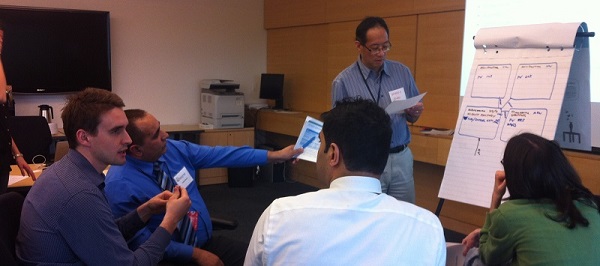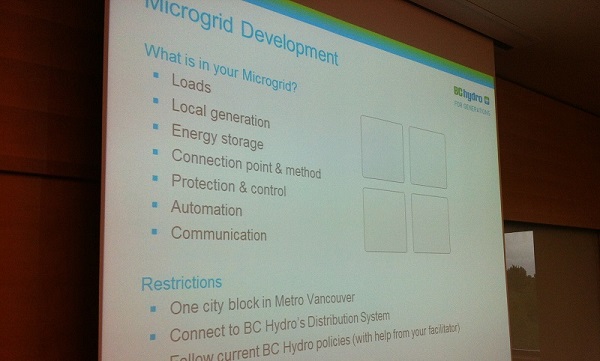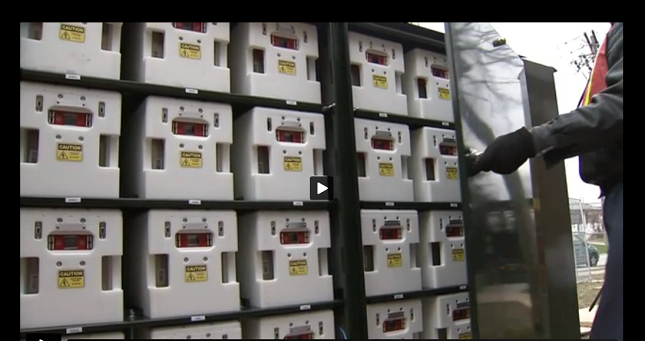On Friday May 17th BC Hydro hosted a select group of NSMG-Net students from across the country for a one day workshop. The theme of the day was Microgrid Emergencies.

The workshop was conceived by BC Hydro to help students appreciate the issues involved in preparing islandable renewable energy microgrids for emergency outage situations.

In the morning, students heard from Ted Borer, who runs the campus microgrid at Princeton University. The university famously withstood Hurricane Sandy, while much of the rest of the region was blacked out. The college newspaper even made a video of the event.

Students were then given guided tours of BC Hydro’s provincial control centre, and the outage control room.

In the afternoon BC Hydro staff led the group through a tabletop exercise. In teams, participants designed their own microgrid with various loads, generation and protection features. Their fictional grids were then subjected to various outage scenarios to see how they would perform.

Other network utility and technology partners interested in hosting similar workshops, should contact the Network Manager.


Reza Iravani (Theme 1 Leader) and Mohamed Zakaria Kamh of the Energy Systems Group at the University of Toronto have prepared two reports for NSMG-Net partner CanmetENERGY. The papers are available in the Researchers’ section of the NSMG-Net website. (Please email the Network Manager for login details.)
The reports model a potential microgrid at the BCIT campus, and are titled:
- Modeling and Simulation of BCIT Campus Microgrid with Multiple On-site DER Units, and
- Advanced Feeder Automation and Fault Detection Techniques for BCIT Microgrid
Associated PSCAD files are also available upon request.

The Pembina Institute and Bullfrog Power are partnering to bring experts, community members, manufacturers and researchers from across North America to Toronto. The groups will discuss how we can learn from major recent successes in places such as Alaska and Australia. Attendees will understand how enabling indigenous and other communities to develop local clean energy projects can help these communities displace their reliance on diesel fuel.
Interested students are encouraged to attend this conference, which is hosted by NSMG-Net partner Ontario Centres of Excellence’s MaRS Discovery District and co-sponsored by NSMG-Net partner NRCan.
NSMG-Net Project Leader, Julian Meng, University of New Brunswick is developing a compact sensor node. The Zigbee sensor node, in a weather-proof housing with battery, is capable of wireless boot-loading to allow for reconfiguration of the node’s function. The internal and external sensors can be used for temperature, vibration, current, pressure and humidity through an I²C interface, which allows for the flexibility of later add-ons. The node will offer magnetic mounts to allow for deployment almost anywhere.
The NSMG-Net Project 3.3 team, which includes Masters student Tristan Losier, is also working on a larger version that will be able to house a small solar panel for extended field life.
Initial testing has seen the survival of the node under New Brunswick winter weather conditions for a few days. Further testing both indoors and outdoors under varying weather conditions will be conducted.
This sensor node will be able to accommodate innovations produced by other researchers in the network’s Communication and Information Technology research theme. Sensors such as these are vital for communicating real-time environmental data within a microgrid, for both regular monitoring and in case of emergency islanding.

From the University of Toronto media release:
Toronto’s electrical system is a little smarter now, thanks in part to a University of Toronto team led by Professor Reza Iravani of Electrical & Computer Engineering.
Toronto Hydro has installed a 250-kW, 48-module battery storage unit at a North York community centre that is strong enough to power a small street for one hour. But what makes the unit unique, says Iravani, is that it is connected to the Toronto Hydro power grid, and can store energy during off-peak times to later release it back into the grid as needed.
The project was developed by a consortium comprising Toronto Hydro, Markham-based eCAMION, Korean battery manufacturer Dow-Kokam and U of T. Iravani and his team developed and implemented the algorithms that integrate the battery system through a power electronic converter in the Toronto Hydro grid.
“This is not just an academic research project,” said Iravani, the coordinator of U of T’s Centre for Applied Power Electronics. “We had to deliver a functioning system with the high degree of reliability that Toronto Hydro requires.”
“We’re providing the brain for the operation of this battery system to appropriately integrate it into Toronto Hydro’s distribution grid.”
More here.









